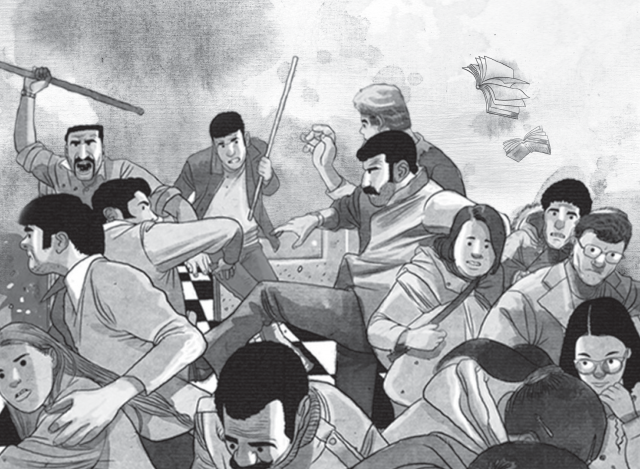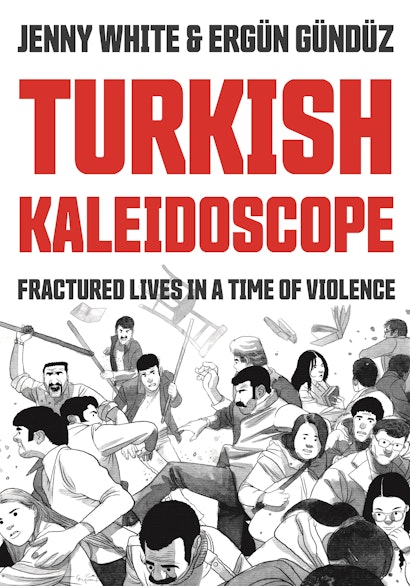Despite the street violence that plagued Turkey and the anxiety and fear that coated residents like an invisible second skin, it was still the 1970s and, like everywhere in the world, music was King. Villages hosted wandering bards for dueling performances of lute music and poetic verses composed on the spot. On the big-city stage, Zeki Müren, with his magnificent voice and gender-bending attire, sang elegant love songs set to classical Turkish music. Rock-and-roll and Western pop bred new styles of Anatolian music, its lyrics ranging from longing to resistance to silly fun. The works of famous poets were set to music. It became popular to give well-known foreign songs new Turkish lyrics in what was called aranjman style. Arabesk, a relatively new type of music combining Arabic and Turkish elements, became enormously popular among the working classes. Its themes echo melancholy, unrequited love and the harshness of city life for migrants from the countryside. I’ve always thought it resembled American blues music. Esmeray, Turkey’s first black singer, became a sensation with her song about separated lovers. Despite the severe political and economic crises, despite the ubiquitous street violence, people went to work, fell in love, and raised families. People tell me that they have lovely childhood memories from those days, though with the sound of gunshots in the background. And, like everywhere, people remember where they were when they first heard this or that song that has stayed with them, hearts beating rapidly whenever they hear the opening chords. This playlist may or may not make you cry, but at the very least it will surprise you with the diversity and haunting beauty of its songs. The list was compiled by the talented Zeynep Isil Isik Dursun, a scholar and former DJ who has studied the music of this period. I admit to sneaking in a couple of favorites, the ones that make my heart beat.
Listen to the Spotify Playlist.
Annotated Song List
Benimle Oynar Mısın? – Bülent Ortaçgil
Bülent Ortaçgil asks: “If I were water, if I were fire, if I were the sun in the skies, if I were a stone and couldn’t speak, will you still play with me?”
Anlatamıyorum – 21. Peron
“I Can Not Tell” is a rock composition based on a poem by the Turkish poet Orhan Veli Kanık. “If I cried, could you hear it from my verses? Could you touch my tears with your hands?”
Çemberimde Gül Oya – Selda Bağcan
An Anatolian pop cover of a folk song about two lovers. The man was put in prison because of his left-wing ideas and the woman made embroidery lace while waiting for him. Selda Bağcan is an internationally known left-wing singer.
Kâtip Arzuhalim – Barış Manço
An Anatolian rock cover of a folk song by Pir Sultan Abdal, a rebel Alevi poet who was imprisoned and sentenced to death in the early 16th century, accused of resistance against the Ottoman Empire. Barış Manço identified himself as neither left nor right, but as a “patriot folk poet.”
Hürriyete Doğru – Timur Selçuk
“Towards Freedom” is based on a poem by Orhan Veli Kanık about moving forward to freedom in the sea. The song is also associated with Deniz Gezmiş, one of the student leaders of the 68 Movement in Turkey who was sentenced to death in 1972. The name “Deniz” means sea.
Toroslar – Moğollar
An instrumental Anatolian rock song dedicated to the Toros Mountains in southern Anatolia.
Gel Teskere – Mürüvvet Kekilli
An arabesk version of a folk song about a man missing his love while doing military service in the army, sung by the left-wing folk singer Mürüvvet Kekilli. Arabesk is a unique mixture of Arabic and Turkish folk musical styles that became enormously popular in the 1960s and 1970s.
Bu Ne Sevgi Ah, Bu Ne Izdırap – Zeki Müren
A song about the anguish of love by one of Turkey’s most accomplished singers of Turkish classical music, the flamboyant Zeki Müren.
Hayat Kavgası – Orhan Gencebay
An arabesk song about the harsh battle of life. Arabesk was often associated with new migrants in shantytowns and right-of-center politics. Its themes echo melancholy, love and the difficulties of migrant life in the cities.
Ekmek Parası – Ferdi Tayfur
An arabesk song about Turkish guest workers in Germany, working for “bread money” and missing their families.
Krallar – Erkin Koray
A progressive rock song by one of the leaders of the genre in 1970s Turkey.
Anayasso – Selda Bağcan
An Anatolian pop song about tough living conditions and poverty in Eastern Anatolia.
Yeter Artık – Melike Demirağ
Melike Demirağ, a left-wing singer, calls “Enough” to corruption, injustice and inequality.
Hoşgör Sen – Ajda Pekkan
Ajda Pekkan, a Turkish “superstar,” reminds us that life is short and people should have more tolerance and enjoy life.
Para Parra Parrra – Rüçhan Çamay
Rüçhan Çamay sings “Money money moneyyyy, its existence brings troubles; its lack is a wound.”
Yoksulluk Kader Olamaz – Cem Karaca
“Poverty Can’t Be Fate” is a progressive song criticizing popular culture, inequality and economic imbalance. Cem Karaca’s songs carry a strong left-wing political discourse.
Ilgaz – Moğollar
An instrumental Anatolian rock song dedicated to the Ilgaz Mountain in northwest Anatolia.
Drama Köprüsü – Ruhi Su
An Ottoman folk song from Rumelia, today’s Greece. Ruhi Su is a pioneer in modernizing the folk music of Turkey.
Örenli Gelin – Selahattin Alpay
A folk song from Malatya, sung by the right-wing folk singer Selahattin Alpay.
Maden Dağı – İzzet Altınmeşe
A folk song from Diyarbakır, sung by the right-wing folk singer İzzet Altınmeşe.
Uzun İnce Bir Yoldayım – Tülay Özer
A well-known folk song about life and its uncertainty, by the famous folk poet Aşık Veysel. “I’m on a long and thin road, I’m going night and day. I don’t know how I am, I’m going night and day…”
Dağlar Dağlar – Barış Manço
An Anatolian rock song about a man longing for his beloved behind the mountains.
Edalı Gelin – Seyhan Karabay
An Anatolian folk song about a pretty bride, reinterpreted in Anatolian pop style.
Leylim, Leylim – Fikret Kızılok
An Anatolian pop song about two lovers. The woman was forced to marry another man in the village.
Sevenler Ağlarmış – 3 Hürel
An Anatolian rock song about seeking love.
Hoşçakal Kardeşim Deniz – Zülfü Livaneli
Melodizing a poem by the socialist Turkish poet Nazım Hikmet, Zülfü Livaneli sings a goodbye song to the sea. The song is in memory of Deniz Gezmiş, a student leader who was sentenced to death in 1972. The name “Deniz” means “sea.”
Ellerinde Pankartlar – Ruhi Su ve Dostlar Korosu
Ruhi Su was a pioneer in modernizing folk music. This song is about young people going to a demonstration with “banners in their hands.”
1 Mayıs – Cem Karaca
An anthem about May 1st, written by Sarper Özsan. This song was originally made for the theater play “Mother”, adapted from Maxim Gorki’s novel and played by the Ankara Art Theater. The song quickly became one of the emblematic songs of the workers’ movement.
Elele – Melike Demirağ
Melike Demirağ sings about people hand in hand, aiming for the same goal: renovating the country from scratch through revolution.
Dönek Türküsü – Timur Selçuk
“The Renegade Song” is about political renegades turning their backs and going wherever the wind blows.
Oooh… Ooh!.. – İstanbul Şarkıcıları
A sarcastically critical song about not worrying about anything, being thankful, having fun, following the mainstream media and not worrying about anything.
Gençlik Şarkısı – Erol Büyükburç
A song about being young, having fun, not worrying about anything and running toward happiness.
Bak Şu Adama Aşık Oldu – Ayla Algan
A pop song about the love between an elderly man and a young woman.
Sevdim Bir Genç Kadını – Esin Engin
A well-known tango love song from the early republican era, sung by Esin Engin in the 1970s.
İspanyol Meyhanesi – Timur Selçuk
A hit song from Timur Selçuk, who is also known for his political songs.
Unutama Beni – Esmeray
This popular song from the 1970s is about a separated lover who sings “Don’t be able to forget me…”. Esmeray was the first well-known black musician and actress born and raised in Turkey.
Bak Bir Varmış Bir Yokmuş – İlham Gencer
This is a version of the French song “C’est écrit dans le Ciel” by Bob Azzam, arranged with Turkish lyrics in 1961. The song is one of the first examples of the Turkish aranjman style, the arrangement of well-known foreign songs with new Turkish lyrics. The song tells a love story from İstanbul, repeating the title phrase “once upon a time” frequently. İlham Gencer is a jazz pianist and singer who was close to the right-wing MHP in the 1970s.
Resimdeki Gözyaşları – Cem Karaca
A popular Anatolian-rock song about lovers who have split up.
Karlı Kayın Ormanı – Zülfü Livaneli
“Is my homeland, or the stars, or my youth further away?” Zülfü Livaneli composed the music for a poem by Nazım Hikmet, a socialist poet who lived in exile after the 1950s.
Mihriban – Musa Eroğlu
A popular poem of the 1960s and 1970s, written by Abdurrahim Karakoç to a young, unnamed woman, with whom he fell in love, but was never able to get together. Alevi singer Musa Eroğlu composed this version in 2000.
Uyan Be Kardeşim – Hakkı Bulut
A song calling on the oppressed public to wake up and rise. Arabesk songs usually don’t carry a critical and revolutionary attitude, but this song is an exception.
Bir Gün Gelecek – Esmeray
The song “We Shall Overcome” became a key anthem of the Civil Rights Movement in the USA and was sung around the world during the 1960s and 1970s. This is the Turkish version of the song, translated as “A Day Will Come.” Esmeray was the first well-known black musician born and raised in Turkey.

